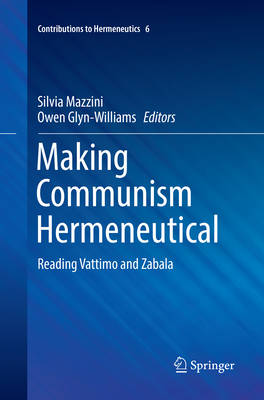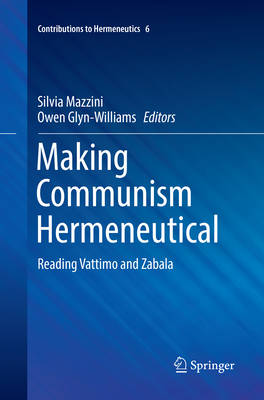
- Retrait en 2 heures
- Assortiment impressionnant
- Paiement sécurisé
- Toujours un magasin près de chez vous
- Retrait gratuit dans votre magasin Club
- 7.000.0000 titres dans notre catalogue
- Payer en toute sécurité
- Toujours un magasin près de chez vous
Making Communism Hermeneutical
Reading Vattimo and Zabala
105,45 €
+ 210 points
Description
This book aims to provide fresh perspectives on Vattimo and Zabala's groundbreaking foundational text, Hermeneutic Communism, from 2011. The contributors to this collection of essays explore various facets of Vattimo and Zabala's "anarchic hermeneutics" and "weak communism" in order to investigate the concepts resulting from them, such as "framed democracies," "armed capitalism" and "conservative impositions." Vattimo and Zabala's text is one of the most innovative contributions to the current debate on Communism, in which authors such as Badiou, Negri, and Rancière have been the protagonists so far.
The unique and original contribution of Vattimo and Zabala's position consists in letting politics evolve from one of the anarchic origins of hermeneutics: the end of truth. This triggers the essential question of how far politics is possible without truth. One of the essential, methodologically innovative characteristics of this collection is its dialogical, hermeneutical form, which is achieved by inserting Vattimo and Zabala's personal reactions to each essay in the book. By responding to each chapter in turn, Vattimo and Zabala establish a hermeneutic dialogue with the contributors. Thus hermeneutics will not only be a central topic, but also an epistemological, concrete application of Vattimo and Zabala's theories.
An indispensable critical tool for students, researchers, professors, activists and general readers interested in the philosophical and political debate on Communism, which encompasses a wide variety of disciplines such as philosophy, political science, sociology, postcolonial studies, critical theory and Latin American studies. Offering an innovative first analysis of the new concepts of Hermeneutic Communism, this book represents a vital contribution to the understanding of the intriguing interrelation between philosophical hermeneutics and political communism.
"A very much needed and refreshing perspective for all those interested in rethinking radical politics beyond both political Eurocentrism and philosophical imperialism." (Chiara Bottici, New School of Social Research, and author of Imaginal Politics)
"The book offers much food for thought both for those who have given up hope and for those who have been fighting for a better world for some time...The contributions to Making Communism Hermeneutical may be seen as step in the direction of a much-needed change in thinking." (David Block, ICREA Research Professor in Sociolinguistics, Universitat de Lleida)
The unique and original contribution of Vattimo and Zabala's position consists in letting politics evolve from one of the anarchic origins of hermeneutics: the end of truth. This triggers the essential question of how far politics is possible without truth. One of the essential, methodologically innovative characteristics of this collection is its dialogical, hermeneutical form, which is achieved by inserting Vattimo and Zabala's personal reactions to each essay in the book. By responding to each chapter in turn, Vattimo and Zabala establish a hermeneutic dialogue with the contributors. Thus hermeneutics will not only be a central topic, but also an epistemological, concrete application of Vattimo and Zabala's theories.
An indispensable critical tool for students, researchers, professors, activists and general readers interested in the philosophical and political debate on Communism, which encompasses a wide variety of disciplines such as philosophy, political science, sociology, postcolonial studies, critical theory and Latin American studies. Offering an innovative first analysis of the new concepts of Hermeneutic Communism, this book represents a vital contribution to the understanding of the intriguing interrelation between philosophical hermeneutics and political communism.
"A very much needed and refreshing perspective for all those interested in rethinking radical politics beyond both political Eurocentrism and philosophical imperialism." (Chiara Bottici, New School of Social Research, and author of Imaginal Politics)
"The book offers much food for thought both for those who have given up hope and for those who have been fighting for a better world for some time...The contributions to Making Communism Hermeneutical may be seen as step in the direction of a much-needed change in thinking." (David Block, ICREA Research Professor in Sociolinguistics, Universitat de Lleida)
Spécifications
Parties prenantes
- Editeur:
Contenu
- Nombre de pages :
- 261
- Langue:
- Anglais
- Collection :
- Tome:
- n° 6
Caractéristiques
- EAN:
- 9783319865331
- Date de parution :
- 10-08-18
- Format:
- Livre broché
- Dimensions :
- 155 mm x 15 mm
- Poids :
- 433 g

Seulement chez Librairie Club
+ 210 points sur votre carte client de Librairie Club
Les avis
Nous publions uniquement les avis qui respectent les conditions requises. Consultez nos conditions pour les avis.






